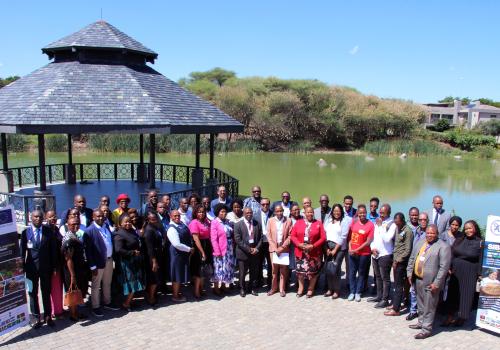The Southern African Development Community (SADC) Secretariat has provided technical assistance to Angola, Botswana, Eswatini and Malawi in developing National Financial Inclusion Strategy (NFIS) with a view to improving access, uptake, and utilisation of quality financial services and products for consumers and Small and Medium Enterprises (SMEs) for effective participation in the SADC Industrialisation Strategy and Roadmap.
The marginalised and vulnerable population within the SADC Region faces several impediments that include inadequate financial infrastructure, limited financial literacy, high transaction costs, rigid regulations, and discriminatory practices that deter access to financial services.
SADC has recently concluded its support to Botswana in developing its National Financial Inclusion Strategy and Roadmap (2024– 2030) with the aim to reducing poverty, promoting economic growth, and increasing financial stability.
Addressing delegates at the validation workshop for the Botswana National Financial Inclusion Strategy (2024– 2030) in Gaborone, Botswana on 10th November 2023, Mr. Rado Razafindrakoto, Programme Officer, Financial Sector at the SADC Directorate of Finance Investment and Customs, said the SADC Region has achieved significant reduction in financially excluded adults from 43% in 2011 to 27% in 2022.
The development of the Botswana NFIS (2024 -2030) was made possible through the Support to Improving the Investment and Business Environment in the SADC Region (SIBE) Programme which is funded by the European Union and implemented by the SADC Secretariat. SIBE provides technical assistance in developing NFIS and identify key financial inclusion regulatory areas for harmonisation and capacity building aimed at reducing costs of remittances and developing financial products for SMEs.
The SIBE Programme provided technical support to Botswana in reviewing its National Financial Inclusion Strategy and Roadmap (2015 – 2021) to inform the foundational strategic imperatives for the development of the successor Botswana National Financial Inclusion Strategy and Roadmap (2024 – 2030) in line with the National Vision 2036 and its implementation tool, the National Transformation Strategy (NTS) as well as the SADC Financial Inclusion Strategy and Small and Medium Enterprises (SME) Access to Finance (2023-2028).
The Botswana NFIS (2015-2021) achieved notable improvements in household welfare, economic efficiency and growth; 6% reduction of adults who were financially excluded; and a 7% increase in access to more than one formal financial product. The Botswana NFIS (2015-2021) also enhanced the infrastructure of the financial sector, improved regulation, and reduced risks; and strengthened facilitation of targeted credit to productive enterprises and for investment in assets. Nonetheless, it was recognised that further reforms were required in the legal, regulatory, policy and institutional frameworks.
Delivering her opening remarks at the validation workshop of the Botswana NFIS (2024 – 2030), Ms. Sarah Molale, Deputy Secretary of Finance and Administration at the Ministry of Finance of the Republic of Botswana said the Botswana NFIS and Roadmap (2024–2030) was meticulously crafted, widely shared and reviewed by multiple key stakeholders to ensure that it was fit for purpose within the wider financial ecosystem and the national aspirations of inclusivity in economic activities.
The objective of the Botswana NFIS (2024– 2030) is to contribute to the achievement of sustainable and inclusive economic growth in Botswana, support job creation through inclusion of all players in the economy, particularly the excluded population segments such as women, youth and SMEs.
The Botswana NFIS 2024–2030 aims to increase financial and credit literacy to address the lack of understanding of obligations and risks of debt, managing debt, and over-indebtedness as well as increasing access to affordable, convenient, appropriate financial services and products to all segments of society to meet the needs of individuals and businesses who are traditionally underserved or excluded from the mainstream financial system such as women, youth and SMEs.
Mr. Walebatla Kgwakgwe, Director, Financial Inclusion and Anti-money Laundering (Policy) at the Ministry of Finance of the Republic of Botswana summarised the deliberations of the validation workshop. In addition to the proposed 20 recommendations and a set of 60 initiatives of the Botswana NFIS and Roadmap 2024– 2030 the validation workshop added value to the Strategy by adopting the following key recommendations:
- Strengthening & Harmonisation of Financial Inclusion Legal and Regulatory Framework such as Economic Inclusion Act;
- Adoption of the Implementation Matrix/RoadMap and budget for the proposed interventions;
- Integrating the budget for financial inclusion interventions within the National Development Plans and Private Sector budgeting cycles;
- Government to facilitate the Private Sector to take the lead in innovating solutions for financial inclusion through policy development;
- Development of a comprehensive insurance cover;
- Development of a National Payment Switch; and
- Strengthening of Financial Literacy
The Botswana Government proposes to launch the National Financial Inclusion Strategy and Roadmap 2024– 2030 in January/February 2024.

